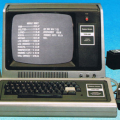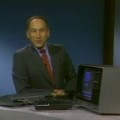Tandy Corp. v. Personal Micro Computers, Inc.
In February 1981, Tandy filed a lawsuit in the state of California against Personal Micro Computers concerning the PMC-80, their Model I compatible computer. Personal Micro Computers was the United States distributor of the PMC-80 but the computer was manufactured by EACA International in Hong Kong.
The case, Tandy Corp. v_. Personal Micro Computers, Inc._, was an important precedent in computer copyright law. Along with _Apple Computer, Inc._ v. _Franklin Computer Corp._ in 1983, this decision helped to establish the concept that computer code was protected by copyright. Even today, it is frequently cited in computer copyright cases.
From the news article “Tandy Sues Personal Micro” in the May 1981 issue of 80 Microcomputing:
The suit, against Personal Microcomputers of Mountain View, CA, and five manufacturing and distributing firms, alleges the input/output programming of the PMC-80 microcomputer is copied from the TRS-80 and that the PMC name is confusingly similar to the TRS-80 registered trademark owned by Tandy.
The news article “Personal Micro to Fight Shack Suit” in the July 1981 issue of 80 Microcomputing described the response from Personal Micro Computers to the lawsuit:
Personal Micro Computers, Inc. has issued a statement promising vigorous defense in a suit filed by Tandy/Radio Shack charging copyright infringements.
Dr. Lester Lee, PMC president, said, “It is quite obvious that the purpose of this suit is to intimidate present PMC dealers and, most importantly, to ‘scare off' potential dealers who might be interested in carrying the PMC-80 product line.”
At issue is the PMC-80, a Z-80 chip-based microcomputer compatible with most TRS-80 software and peripherals. Tandy, in the suit filed Feb. 19 in U.S. District Court, San Francisco, CA, claims the machine’s I/O routines are copies of TRS-80 routines and violate Tandy copyrights. They also maintain the PMC-80 trademark is “confusingly close” to the TRS-80 name and is a trademark infringement.
The disputed “I/O routines” in the PMC-80 ROM involved the portion written by Radio Shack. This included the disk bootstrap, keyboard, video, and printer routines, which totaled less than 2K of the total ROM. The PMC-80 used a version of Microsoft BASIC licensed by EACA so the Microsoft code was not part of the lawsuit.
Including Personal Micro Computers and EACA, the final version of the lawsuit listed eight defendants. The other defendants were presumably dealers for the PMC-80.
The lawsuit alleged five causes of action:
- copyright infringement
- unfair competition under federal law
- unfair competition under state law
- assumpsit
- interference with prospective advantage (unjust enrichment)
The defendants initially moved to dismiss all five counts, but focused their arguments almost entirely on the first count. Their primary argument was that computer code in a ROM was not covered by copyright. After the judge indicated that he was prepared to deny the motion as it related to counts two through five, the defendants withdrew their motion to dismiss those counts. That left the motion to dismiss based entirely on count one: copyright infringement. In an August 31, 1981 ruling, the judge rejected the defendants' argument that ROM code wasn’t copyrightable and denied the motion for dismissal.
What happened next isn’t very clear. I can’t find any indication that the case ever went to trial, so presumably the suit was dropped or settled. One thing that is clear is that advertisements for the PMC-80 and PMC-81 disappeared from the pages of 80 Microcomputing. Personal Micro Computers finally discontinued the PMC-80 and PMC-81 in late 1983 when they introduced their MicroMate CP/M workstation.
But I still have a number of unanswered questions, including:
- The EACA computer was sold by distributors in other countries using different names, including the System 80 and the Video Genie. Why didn’t Tandy ever sue any of those distributors?
- Did Personal Micro Computers settle the case with Tandy or is it possible that Tandy just dropped the lawsuit?
- Considering the small amount of disputed code, why didn’t Personal Micro Computers or EACA just rewrite it and avoid a lawsuit entirely?
- Why didn’t the lawsuit and decision stop sales of the PMC-80 and PMC-81? Personal Micro Computers continued to sell the computers for an additional two years.
A good article which addresses the origin and legal issues behind the EACA computer is on Terry Stewart’s Tribute to Dick Smith’s System 80.












David Sutherland says:
Is the point four of the “causes of action” listed correctly?
Good article. I would like Frank Durda IV’s reaction.
Matthew Reed (TRS80.org) says:
Yes, the points are all taken straight out of Chief Judge Peckham’s decision. Assumpsit refers to an action to recover damages from a breach of a contract.